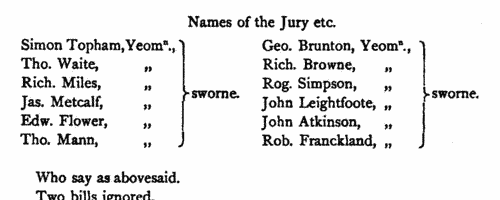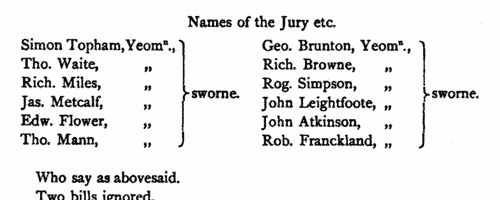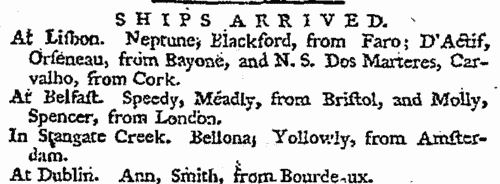Add this eBook to your basket to receive access to all 50 records. Our indexes include entries for the spelling postgate. In the period you have requested, we have the following 50 records (displaying 11 to 20): These sample scans are from the original record. You will get scans of the full pages or articles where the surname you searched for has been found. Your web browser may prevent the sample windows from opening; in this case please change your browser settings to allow pop-up windows from this site. PCC Probate Abstracts
(1650-1651)
The Prerogative Court of Canterbury's main jurisdiction was central and southern England and Wales, as well as over sailors &c dying abroad: these brief abstracts usually give address, date of probate and name of executor or administrator
| Sample scan, click to enlarge

| Gentlemen and yeomen of the North Riding of Yorkshire
(1647-1658)
The Quarter Sessions minute books for the North Riding from October 1647 to January 1658 were edited by the Rev. J. C. Atkinson for the North Riding Record Society and published in 1887. These are abstracts of sessional orders, minutes of criminal cases, memoranda and other entries of record concerning the administration of the riding. Adult male householders of substance (gentlemen and yeomen) from the constituent townships in the riding were liable to serve on the quarter sessions juries, and lists of the jurors present are attached to each part of the proceedings. | Sample scan, click to enlarge

| Quarter Sessions for the North Riding of Yorkshire
(1647-1658)
The Quarter Sessions minute books for the North Riding from October 1647 to January 1658 were edited by the Rev. J. C. Atkinson for the North Riding Record Society and published in 1887. These are abstracts of sessional orders, minutes of criminal cases, memoranda and other entries of record concerning the administration of the riding. | Sample scan, click to enlarge

| York Will Calendar
(1660-1665)
The diocese of York comprised most of Yorkshire, and Nottinghamshire: the York Exchequer court was the ordinary probate jurisdiction for the Yorkshire part of the diocese, but some wills from Nottinghamshire and other parts of the province of York were also proved there. Dr Francis Collins compiled this index to the wills in the York registry proved from 1660 to 1665. The date of the probate precedes the name of the testator: during the period covered by the volume the dates of probate are very rarely given in the registers - they were therefore supplied from the Act Books. However, the Act Book for Ainsty, City and Craven deaneries is missing for this period, and in those cases no date could be given. In a very few instances (marked with an asterisk) in these deaneries in which the date has been supplied it has been taken from the registers. Additional matter from the Act Books is given within square brackets. Testators' names are given in full, surname first; then parish or place of abode, and in some cases occupation; then date of the will itself; and volume and folio number in the probate register. Where a place of burial, or intended burial, was indicated, that is also added, with the word 'bur.', within round brackets. All wills between 1652 and 1660 were proved in London; in practice, many Yorkshire wills had remained unproved at the date that the York Exchequer probate court was restored, and so there is in this list a large number of wills dating back through the 1650s. | Sample scan, click to enlarge

|  Masters of Apprentices registered at Coventry in Warwickshire
(1713-1715) Masters of Apprentices registered at Coventry in Warwickshire
(1713-1715)
Apprenticeship indentures and clerks' articles were subject to a 6d or 12d per pound stamp duty: the registers of the payments usually give the master's trade, address, and occupation, and the apprentice's father's name and address, as well as details of the date and length of the apprenticeship. There are central registers for collections of the stamp duty in London, as well as returns from collectors in the provinces. These collectors generally received duty just from their own county, but sometimes from further afield. July 1713 to April 1715. (The sample entry shown on this scan is taken from a Norfolk return) | Sample scan, click to enlarge

|  Apprentices registered at York
(1723-1726) Apprentices registered at York
(1723-1726)
Apprenticeship indentures and clerks' articles were subject to a 6d or 12d per pound stamp duty: the registers of the payments usually give the master's trade, address, and occupation, and the apprentice's father's name and address, as well as details of the date and length of the apprenticeship. There are central registers for collections of the stamp duty in London, as well as returns from collectors in the provinces. These collectors generally received duty just from their own county, but sometimes from further afield. Because of the delay before some collectors made their returns, this register includes indentures and articles from as early as 1722. (The sample entry shown on this scan is taken from a Norfolk return) | Sample scan, click to enlarge

|  Masters and Apprentices
(1731) Masters and Apprentices
(1731)
Apprenticeship indentures and clerks' articles were subject to a 6d or 12d per pound stamp duty: the registers of the payments usually give the master's trade, address, and occupation, and the apprentice's father's name and address, as well as details of the date and length of the apprenticeship. 2 January to 2 November 1731. | Sample scan, click to enlarge

|  Apprentices registered at York
(1750-1754) Apprentices registered at York
(1750-1754)
Apprenticeship indentures and clerks' articles were subject to a 6d or 12d per pound stamp duty: the registers of the payments usually give the master's trade, address, and occupation, and the apprentice's father's name and address, as well as details of the date and length of the apprenticeship. There are central registers for collections of the stamp duty in London, as well as returns from collectors in the provinces. These collectors generally received duty just from their own county, but sometimes from further afield. (The sample entry shown on this scan is taken from a Norfolk return) | Sample scan, click to enlarge

| Captains of colliers entering the port of London
(1785)
The Custom House in the port of London posted daily lists of ships. The Coast List was in four parts - Colliers Entered Inwards; Coasters Entered Inwards; Coasters Entered Outwards (i. e., receiving cargo for a prospective voyage); and Coasters Cleared Outwards. Colliers entered inwards are listed by name with the surname of the captain, and the number of the wharf (usually 46, Pelican Stairs, or 49, Stone Stairs). These lists were printed in the Daily Universal Register. May 1785. | Sample scan, click to enlarge

| Masters of Merchantmen
(1785)
The Daily Universal Register of April 1785 includes a section entitled Ship News. This is compiled from reports from Portsmouth, Deal, Plymouth, Whitby, Cowes, Falmouth, Bristol and Gravesend as to merchant shipping movements; news of losses and sightings coming in from various ports; a list of Ships Arrived in the (London) River, in the Clyde, in the Creek(e), in the Downs, off the Lizard, off Scilly, off the Start, in Studland Bay, off Whitby, off the Wight, at Aberdeen, Alicante, Ancona, Antigua, Baltimore, Barbadoes, Barcelona, Bayonne, Belfast, Bombay, Bonny, Bordeaux, Brighthelmstone (Brighton), Bristol, Cadiz, Carlingford, Cartagena, Charlestown, Cork, Cowes, Cuxhaven, Dartmouth, Dominica, Dover, Dublin, Dunkirk, Falmouth, Galway, Gibraltar, Grenada, Guernsey, Halifax (Nova Scotia), Hamburg, Havre de Grace, Hull, Jersey, Kinsale, Lancaster, Leghorn, Limerick, Lisbon, Liverpool, Londonderry, Lochryan, Malaga, Marseilles, Montserrat, Nantes, New Providence (Bahamas), New York, Newry, Oporto, Ostend, Penzance, Plymouth, Poole, Portsmouth, Rotterdam, St Eustatia, St John's, St Kitts, St Vincents, Scarborough, Scilly, Seville, Southampton, Stangate Creek, Tenerife, Texel, Tobago, Venice, Waterford, Weymouth, Whitehaven, and in 'Africa', Georgia, Jamaica, Maryland, North Carolina, Philadelphia, South Carolina and Virginia; and Coast Lists made at the Custom House in London. Except in the home ports, the register refers only to British shipping: each ship is usually identified merely by its name, and the master's surname, although masters' christian names are given occasionally. Naval vessels are mentioned rarely, and their captains' names not usually stated. | Sample scan, click to enlarge

|
Research your ancestry, family history, genealogy and one-name study by direct access to original records and archives indexed by surname.
|












